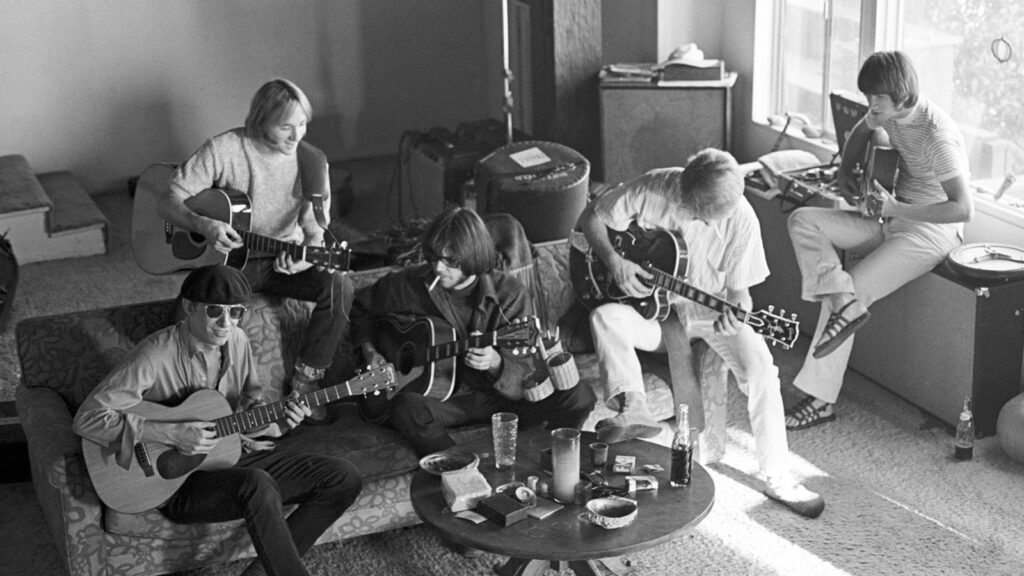This year’s Black Friday Record Store Day had its usual share of curios: a version of Billie Eilish’s Hit Me Hard and Soft with her vocals isolated, Rage Against the Machine’s 2000 set at the Democratic National Convention, a collection of outtakes from Yes’ Fragile, a previously unreleased 1991 Van Halen show, and a blue-vinyl version of Earl Sweatshirts’ Feet of Clay among them.
And then there’s the live album some of us never thought we’d see or hear.
At this point, Buffalo Springfield is fondly remembered as the launch pad for Neil Young, Stephen Stills, and future Poco leader Richie Furay, and for “For What It’s Worth,” which continues to be remade and used in soundtracks, especially for any film with any Sixties connection. The group’s three albums are all gems in very different ways, even if they tragically document the way the group began fragmenting with each subsequent release.
For those who were witnesses at the time, whether in the band’s home base of Los Angeles or in towns where they toured, the Springfield were also known as a ferocious live band whose onstage energy was never quite captured by its studio recordings. Until now, those of us who weren’t there have had to make due with concert bootlegs of varying sonic quality.
But that ended this past Friday with the release of a Record Store Day special: the double-vinyl Live at the Monterey International Pop Festival. One LP is devoted to the Byrds’ entire set (much of it already issued) at the historic 1967 gathering, but the second consists, at long last, of Buffalo Springfield’s performance, marking the first time we’ve received an official live record from the band.
So after nearly sixty years, we get to hear the Springfield onstage — but, of course, with one important caveat: It’s still a Young-free zone.
As has been long documented, Young bailed on the Springfield just before what would become an historic festival that made names of Janis Joplin, Jimi Hendrix and the Who and fully introduced Otis Redding to the counterculture heads in the crowd. In Young’s place, at least for a brief period, was guitarist Doug Hastings, of the Daily Flash and later Rhinoceros. Also joining the Springfield that day, much to the irritation of his fellow Byrds, was David Crosby, who sang and strummed along with his newfound pal Stills.
Thanks to that personnel disruption, the Springfield’s eight-song set at Monterey Pop has been dismissed, mostly by the band members themselves. So it’s no wonder that, except for a clip of “For What It’s Worth” that night, most of this music has sat in the vaults for so long. But as the RSD release belatedly proves, it’s still worth hearing the recording, both for its historic importance (the way it set the stage for Crosby, Stills & Nash a year later) and some of its performances.
Start with the actual sound of the band. Young’s absence is noticeable, but Dewey Martin’s drumming has never sounded so vibrant and crackling; at times it’s mixed as high up as the vocals. The same with Bruce Palmer, who had just returned to the band after being deported to his native Canada for drugs; during the live version of “Bluebird” here, his bass line is gargantuan. Forced to take charge more than ever, Stills is heard truly starting to come into his own, whether as a lead guitarist or premiering a new song, “Pretty Girl Why.” The take of the latter heard here isn’t as smooth and sinuous as the version on the final Springfield record, Last Time Around, but Crosby’s voice adds a new blend to the song — which Stills himself must have taken notice of, given how they’d form a band together months after the festival.
Of the other songs, Furay’s “A Child’s Claim to Fame,” played here with electric instead of the largely acoustic instruments of the studio version, sounds more than ever like a precursor to Poco and also one of the first country-rock mergers. Furay’s poignant delivery of Young’s “Nowadays Clancy Can’t Even Sing” proves he was always the best person to tackle that song. On the down side, a version of Stills’ “Hung Upside Down” feels malnourished, and Furay’s “Nobody’s Fool,” sung by razor-voiced Martin, is a clattering mess.
The intriguing hint of things to come arrives with the penultimate song, “Rock & Roll Woman,” the likely first collaboration between Stills and Crosby. As Crosby told me in 2017, with a grin, “My lick. I showed it to him because I had thought of it and he swiped it. But I was happy. It was a good record.” (On Buffalo Springfield Again, Stills was credited as songwriter and Crosby as “inspiration.”) The Monterey version, the first time they played it live, lacks the crystalline sparkle and the pushy guitar solos in the studio version, but hearing Crosby add his harmonies is a minor revelation.
Without taking a break, the band wrapped up its set by launching right into “Bluebird.” Again, this somewhat ragged rendition isn’t equal to the multi-layered studio version or live ones heard on bootlegs; in particular, the Stills and Young interplay from a Dallas 1968 show makes the Springfield sound like the true originators of the jam band concept. But Hastings dutifully recreates Young’s parts, and the energy of the band, as it tries to make a case for itself without its MIA member, is a kick. Now let’s hope we don’t have to wait another fifty-something years to see the footage of the whole show — or to hear more live recordings from a band that lived fast, died young and left a beautiful catalog.
